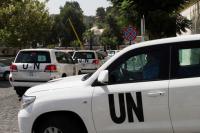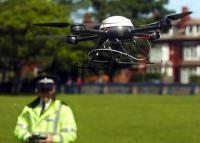-
Watchdog: Evidence suggests Assad kept chemical weapons program in violation of 2013 deal
After launching a lethal sarin gas attack in August 20013 — which killed 1,400 Sunni civilians in a Damascus suburb — the Assad regime agreed to get rid of its nerve agents under the supervision of OPWC, the UN chemical weapons watchdog. In summer 2014 OPCW announced that Syria’s declared chemical weapons stockpile had been removed – but in a classified report submitted Wednesday to the Security Council, OPWC says that Syria has violated the 2013w agreement by keeping some of its chemical weapons program, and by continuing to use chemical weapons in attacks against civilians.
-
-
U.S. has given 1.4 million guns to Iraq, Afghanistan -- but doesn’t know where, by whom these weapons are currently being used
The United States has given more than 1.4 million guns to Iraqi and Afghan forces, as part of the more than $40 billion worth of U.S. Department of Defense arms and munitions contracts since 9/11. The Pentagon has only partial, and not necessarily accurate, information not only about the total number of firearms involved, but how, where, and by whom these weapons are currently being used. Journalists have offered evidenced that many firearms openly available for purchase on black markets and on social media throughout the Middle East were originally provided by the Pentagon to U.S. associates in Iraq and Afghanistan.
-
-
Iran threatened to halt nuke talks if U.S. bombed Assad, WSJ reporter says

President Barack Obama changed his mind about launching a retaliatory strike against Syrian President Bashar al-Assad, whose forces carried out a sarin gas attack that killed more than 1,400 people in August 2013, after Iran threatened to pull out of then-secret nuclear talks, the chief foreign correspondent for the Wall Street Journal said on Monday.
-
-
How the Islamic State recruits and coerces children
This week the world once again witnessed an Islamic State’s use of at least one child bomber, perhaps two – this time for blowing up the wedding in Gaziantep, Turkey, killing fifty-four people on 20 August. There are important differences in how groups engage children in militant activities. Differences between children in terrorist groups and child soldiers include how children are recruited and what role the parents and community play in recruitment. Understanding these differences helps us know how best to approach treating the children’s trauma, and figure out which children can be rehabilitated and which ones might be vulnerable for recidivism as adults. The number of children who have been exposed to violence in the so-called Islamic State requires efforts be taken to address the trauma, and determine whether these children are victims or perpetrators.
-
-
French schools to hold security drills, including mock terrorist attacks
As part of the French government’s bolstering of security measures in the wake of a series of terrorist attacks, French schools, beginning with the new school year, will now conduct three security drills a year – including at least one drill in which a mock assailants enter the school building.
-
-
UN releases follow-up to report on the mysterious death of former UN chief Hammarskjöld
UN secretary-general Ban Ki-moon the other day released a follow-up note to the 2015 report of an Independent Panel of Experts that was established to examine and assess new information regarding the 1961 death of former UN secretary-general Dag Hammarskjöld. Hammarskjöld’s plane crashed in September 1961 near Ndola, in what was then the British colony of Northern Rhodesia, and is now Zambia. He was on his way t negotiate an end to the war between Congo, which was supported by the Soviet Union, and the breakaway, mining-rich region of Katanga, which was supported by Belgium (openly) and the United States (covertly).The UN is especially frustrated with the United Kingdom for not releasing more intelligence documents which would shed light on the question of whether Hammarskjöld’s plane was brought down by Western intelligence services who wanted Katanga to remain independent of Congo.
-
-
Many sections of Baltimore are under secret, constant aerial video surveillance by BPD

The Baltimore Police Department has secretly deployed a surveillance system using planes and powerful cameras that can continuously record 30-square-mile sections of the city at once. The technology, which is run by a private company, was originally developed for the Defense Department for use in Iraq. It stores the video footage for an undetermined amount of time, and police can use it to retroactively track any pedestrian or vehicle within the surveillance area.
-
-
Why do some people more readily accept the use of torture?
Psychologists have shown that authoritarian people and those who perceive their own group as socially superior to others are often more inclined to accept the use of torture. The thing that unites them is not primarily the urge to defend their own group, but their strong tendency to dehumanize people who do not resemble their own kind.
-
-
Large Turkish forces enter Syria to drive ISIS out of border area
Dozens of Turkish tanks have crossed into Syria earlier this morning as part of a massive operation – code named “Euphrates Shield” — to capture ISIS strongholds around the town of Jarablus and drive the militants out of the area. The land invasion, which also included hundreds of troops, follows hours of relentless airstrikes and artillery barrages against ISIS targets along the Syria-Turkey border. Among the targets hit in the bombardment were arms depots and oil tanks, and huge explosions lighted up the night sky.
-
-
Colombia, FARC to sign historic peace deal today, ending 52-year war
Colombia’s government and the leftist FARC rebel organization have reached a final and comprehensive peace agreement which puts an end to Latin America’s longest war. The FARC campaign against successive Colombian governments began in 1964, leaving more than 220,000 people dead and more than six-and-a-half million displaced. After four years of negotiations, the pace deal will be signed Wednesday evening in Havana, Cuba.
-
-
Presidential candidates may be psychopaths – but this is not necessarily a bad thing
Oxford University’s Dr. Kevin Dutton has spent much of his career looking at psychopaths and researching psychopathic traits, identifying those which can be of benefit and those which can lead to incarceration. He contends that being a psychopath is not an all-or-nothing affair. Instead, psychopathy is on a spectrum along which each of us has our place. In a new study, Dutton finds that Donald Trump ranks above Adolf Hitler and only just below Idi Amin, Saddam Hussein, and Henry VIII. Hillary Clinton ranks between Napoleon and Nero.
-
-
Boko Haram leader “fatally wounded in army air strike”: Nigeria
Nigeria claims to have “fatally wounded” Abubakar Shekau, the leader of Boko Haram, in an air strike targeting a meeting of the commanders of the Islamist group. The Nigerian military says that Shekau and other senior leaders of the group gathered for prayers on Friday, and that they were hit by an “air force raid.”
-
-
Germany to unveil a civil defense plan calling on citizens to stockpile food, water
The German government will tell citizens to stockpile food and water in their homes in order to prepare for a terror attack or catastrophe. The German cabinet will on Wednesday debate an Interior Ministry report, called the “Concept for Civil Defense,” which, among other things will require the population to stockpile enough food ten days and water for five days.
-
-
Israel retaliates against Hamas after Gaza rocket explodes near homes in Sderot
A rocket fired by Palestinian terrorists in the Gaza Strip landed between two houses in the southern Israeli city of Sderot on Sunday, prompting the IDF to carry out airstrikes against Hamas targets in Gaza. Israel responded to the attack by striking two sites in northern Gaza that it said were a part of Hamas’ “terror infrastructure.” Israel holds Hamas, which rules Gaza, responsible for any rocket fire against its citizens.
-
-
Islamist militant pleads guilty to war crimes involving destruction of cultural, historical monuments
An Islamic extremist has pleaded guilty to destroying historic mausoleums in northern Mali city of Timbuktu. Ahmad Al Faqi al-Mahdi told the judges at the International Criminal Court (ICC), where his trial has began today (Monday), that he was entering the guilty plea “with deep regret and great pain.” Mahdi’s trial is the first ICC trial in which an individual was charged for war crimes for destroying historical and cultural monuments.
-
More headlines
The long view
What Does Netflix’s Drama “Adolescence” Tell Us About Incels and the Manosphere?
While Netflix’s psychological crime drama ‘Adolescence’ is a work of fiction, its themes offer insight into the very real and troubling rise of the incel and manosphere culture online.
A Shining Star in a Contentious Legacy: Could Marty Makary Be the Saving Grace of a Divisive Presidency?
While much of the Trump administration has sparked controversy, the FDA’s consumer-first reforms may be remembered as its brightest legacy. From AI-driven drug reviews to bans on artificial dyes, the FDA’s agenda resonates with the public in ways few Trump-era policies have.
The Center Can Hold — States’ Rights and Local Privilege in a Climate of Federal Overreach
As American institutions weather the storms of executive disruption, legal ambiguity, and polarized governance, we must reexamine what it means for “the center” to hold.
How to Reverse Nation’s Declining Birth Rate
Health experts urge policies that buoy families: lower living costs, affordable childcare, help for older parents who want more kids
Foundation for U.S. Breakthroughs Feels Shakier to Researchers
With each dollar of its grants, the National Institutes of Health —the world’s largest funder of biomedical research —generates, on average, $2.56 worth of economic activity across all 50 states. NIH grants also support more than 400,000 U.S. jobs, and have been a central force in establishing the country’s dominance in medical research. Waves of funding cuts and grant terminations under the second Trump administration are a threat to the U.S. status as driver of scientific progress, and to the nation’s economy.
The True Cost of Abandoning Science
“We now face a choice: to remain at the vanguard of scientific inquiry through sound investment, or to cede our leadership and watch others answer the big questions that have confounded humanity for millennia —and reap the rewards.”
